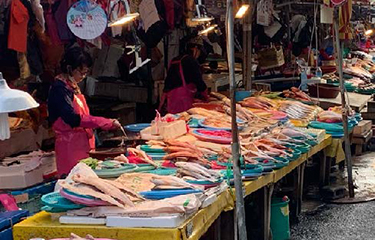A new report by the Environmental Justice Foundation (EJF) is calling on the government of South Korea to increase its seafood traceability requirements.
The report, dubbed “The Broken Barrier,” continues EJF’s criticism of the South Korea’s handling of the seafood industry and pushing for the government to do more to bring the country in line with the standards of other countries. The nonprofit is also pushing for seafood information to be made accessible to the public in order to reassure customers “they are purchasing ethical and sustainable seafood.”
“In 2017, the Korean government responded to international and domestic pressure around seafood legality by introducing limited traceability for seafood imports,” EJF CEO and CO-Founder Steve Trent said in a release. “However, further action is needed. Now is the time to do the right thing for consumers, for fishers around the world and for our ocean.”
South Korea has been the target of criticism regarding issues related to illegal, unreported, and unregulated (IUU) fishing in the past. The U.S. government filed a complaint again South Korea in 2019 under the rules of a free trade agreement, in the wake of a 2019 National Marine Fisheries Service report that said the country failed to deter its vessels from engaging in IUU.
The U.S. removed South Korea from the list of countries potentially engaging in IUU four months after that 2019 complaint, but criticism of the country’s seafood industry didn’t end there. An investigation by EJF, published in 2021, again called out the country for IUU and abuse to migrant workers onboard some of the country’s distant-water fishing vessels.
According to the new report, South Korea continues to have a lack of supply chain safeguards on seafood imports, allowing IUU products to enter the country’s seafood market. The lack of safeguards, EJF said, come as Korean consumers are “increasingly interested” in the sustainability and safety of the seafood they are purchasing.
South Korea is the fifth largest importer of seafood in the world behind the E.U., U.S., Japan, and China, and has the highest seafood consumption per capita at 70 kilograms per year. However, according to the EJF report, the country’s traceability standards lag behind the E.U., U.S., and Japan and don’t track enough “key data elements” essential to determining the origins of seafood being purchase by consumers.
Some data points, such as product type, port of landing, fishing gear, and processing location are not recorded at all by South Korea – leaving loopholes for bad actors participating in IUU.
EJF called on the Korean government to adopt the Global Charter for Fisheries Transparency. A coalition of fisheries advocates and NGOS including the EJF, Oceana, Global Fishing Watch, and more created the charter with ten principles to address transparency in seafood trade and fishing activities. The EJF is also calling on the government of Korea to adopt international standards on labor rights to protect workers’ rights.
“Korea can be a regional leader in sustainable fisheries as a major flag state, port state and market state, but at present not enough is being done to achieve this,” Trent said. “Improving traceability, keeping vessels linked to illegal fishing out of Korean ports and systematically enhancing transparency are essential steps which can be taken now to eliminate illegal, unsustainable and unethical fishing. The barrier is broken, but the Korean government can mend it now.”
Photo courtesy of the Environmental Justice Foundation







